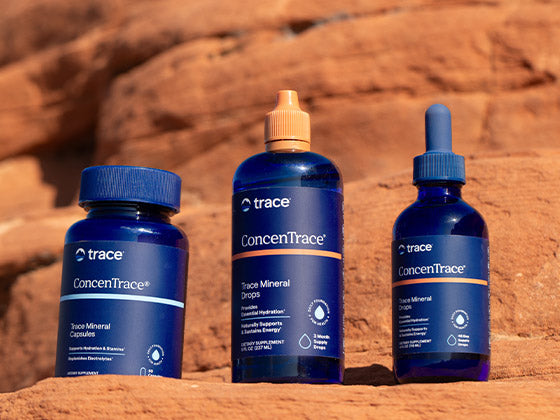What do fatigue, low immunity, poor sleep, and brain fog have in common? They may all stem from the same root cause: a mineral deficiency. While most people understand the importance of vitamins, minerals tend to get overshadowed, despite being just as vital for human health.
Trace Minerals has built its reputation on addressing this crucial gap. As a pioneer in ionic mineral supplementation, we source our minerals from pure, renewable inland seawater and design products that fit effortlessly into daily routines.
In this article, we’ll break down why we need minerals every day, explore how they work inside your body, and show how Trace makes replenishing them easier than ever.
Key Takeaways:
- Foundation For Health: Research suggests minerals are essential to immune function, muscle contraction, hydration, and energy metabolism.
- Daily Replenishment Matters: Our bodies don’t produce minerals, and modern diets often lack sufficient intake.
- Trace Makes It Easy: Trace Minerals offers ConcenTrace® Daily Mineral Powder to help restore optimal balance naturally.
The Role Of Minerals In The Body
Our bodies rely on a complex interplay of nutrients to function. Minerals are involved in nearly every biological process, acting as co-factors for enzymes, structural components in bones, and crucial messengers in the nervous system.
Major functions of minerals include:
- Supporting muscle contraction (especially calcium, magnesium, and potassium)
- Regulating blood pressure
- Enabling oxygen transport via iron in red blood cells
- Maintaining hydration and fluid balance
- Facilitating DNA and protein synthesis
Even a minor deficiency in key minerals can throw off your body’s internal harmony. This is where daily intake becomes essential.
Why We’re Not Getting Enough Minerals
It might seem like we should be getting all our minerals from food. After all, a balanced diet should, in theory, provide everything we need. But in reality, the modern food supply has changed dramatically, and these changes have led to widespread mineral depletion.
Compounding this issue is the fact that modern life increases our need for minerals. Chronic stress depletes magnesium. Common medications, such as diuretics and antacids, interfere with mineral absorption. Environmental toxins can disrupt the body’s natural detox pathways, which rely on minerals for support
Here's a deeper look at why:
Soil Depletion
Over the past century, industrial farming practices have prioritized crop yields over nutrient density. The repeated use of the same fields without proper crop rotation has stripped the soil of its natural mineral content. When the soil lacks minerals, so do the plants that grow in it. Even organic produce can be grown in mineral-depleted soil, meaning even healthy choices might fall short.
Processed Foods
Today’s grocery aisles are filled with ultra-processed foods. These items are designed for convenience and long shelf lives, but the trade-off is the loss of essential nutrients. Refining processes strip grains of their mineral-rich bran and germ, and added preservatives and fillers offer little to no nutritional value. As a result, people consuming these foods may be overfed but undernourished.
Filtered Water
While water filtration systems are important for removing harmful contaminants, they often remove beneficial trace minerals as well. Minerals like magnesium, calcium, and potassium can be lost through common filtration methods. Drinking demineralized water over time may reduce your intake of these essential nutrients unless they are added back in some form.
How Minerals Support Energy Production
When asking, "Why do we need minerals?" One of the most overlooked reasons is their role in ATP (adenosine triphosphate) production, the body’s energy currency.
- Magnesium: Required in over 300 enzymatic reactions, many of which support energy metabolism.
- Iron: Carries oxygen in the blood, making it essential for cellular respiration.
- Phosphorus: A key structural component of the ATP molecule itself.
When your mineral levels are optimized, your energy is more stable, your stamina improves, and you’re less likely to rely on caffeine for a quick fix.
Minerals and Immune Function
Immune health isn’t just about avoiding colds. A strong immune system depends on the proper balance of minerals to function at its best.
- Zinc: Supports immune cell development and aids in wound healing.
- Selenium: Acts as a powerful antioxidant that protects cells from damage.
- Copper: Assists in the production of white blood cells.
Trace Minerals’ products are formulated with these key minerals in bioavailable forms, allowing your body to absorb and utilize them efficiently.
Hydration Isn’t Just About Water
Drinking more water isn’t enough if your electrolyte levels are out of balance. Electrolytes are minerals that conduct electricity in the body, allowing for muscle movement, nerve signaling, and hydration at the cellular level.
Key electrolytes include:
- Sodium
- Potassium
- Calcium
- Magnesium
Trace offers ConcenTrace® in powder form, allowing you to add a dose of minerals to any beverage for balanced hydration support. Whether you’re sweating it out in the gym or simply aiming for better wellness, minerals can help make a difference.
How Minerals Influence Sleep Quality
Many people struggle with sleep disturbances, not realizing that mineral imbalances could be a contributing factor. Research suggests that minerals like magnesium and calcium can be pivotal in the body’s ability to relax and maintain restful sleep cycles.
- Magnesium: Regulates melatonin and activates the parasympathetic nervous system to promote relaxation and sleep.
- Calcium: Aids melatonin production and helps muscles relax after contraction.
A lack of these minerals can lead to tossing and turning, nighttime cramps, and difficulty staying asleep. Supporting your intake through daily supplementation can contribute to more restful and restorative sleep.
The Connection Between Minerals And Mood
Emotional well-being is often influenced by the body’s nutritional status, and minerals are no exception. Science suggests that certain minerals directly impact the brain and nervous system, influencing mood stability and stress resilience.
- Zinc: Supports neurotransmitter function and healthy brain signaling.
- Magnesium: Studied for its role in easing anxiety and depressive symptoms.
- Iron and copper: Help sustain energy levels that impact motivation and mood.
Mineral deficiencies can leave the brain under-supported, leading to mood swings, irritability, and increased stress. Including a mineral-rich supplement can potentially help promote emotional balance.
How Minerals Support Digestion And Gut Health
Digestive health is foundational to nutrient absorption, and minerals are key players in this process. They help regulate enzyme production, maintain gut lining integrity, and balance stomach acidity.
- Zinc: Supports gut lining repair and immune defense in the digestive tract.
- Magnesium: Promotes smooth muscle function to help prevent constipation.
- Chloride: Vital for producing hydrochloric acid to properly break down food.
Proper mineral intake can help ensure your digestive system is functioning efficiently, which in turn improves nutrient uptake and overall wellness.
Minerals And Healthy Aging
As we age, our body’s ability to absorb nutrients declines, making mineral supplementation increasingly important. Aging adults face higher risks of bone loss, muscle weakness, and cognitive decline, all areas where minerals can make a difference.
- Calcium and Magnesium: Help maintain strong bones and reduce the risk of fractures.
- Potassium: Supports muscle function and cardiovascular health.
- Selenium and Zinc: Provide antioxidant protection against age-related cellular damage.
By prioritizing daily mineral intake, aging individuals can support their body's natural defenses, maintain mobility, and promote vitality well into later years.
Why Choose ConcenTrace® Daily Mineral Powder
When selecting a supplement, purity and sourcing matter. ConcenTrace® Daily Mineral Powder from Trace is harvested from Utah’s Great Salt Lake using a proprietary process that retains 72 naturally occurring ionic trace minerals.
Key benefits of ConcenTrace® include:
- Ionic form for superior absorption
- Free from additives and preservatives
- Vegan, gluten-free, and non-GMO
- Easy to mix into any beverage or smoothie
Unlike tablets that may pass through the system unabsorbed, ConcenTrace® is in a highly soluble form that your body can recognize and use.
How To Incorporate More Minerals Into Your Daily Routine
It doesn’t take a complicated regimen to see benefits. Here are a few practical ways to support mineral intake:
- Add ConcenTrace® to your morning smoothie
- Sprinkle it into a glass of water with lemon
- Pair it with magnesium-rich foods like spinach and almonds
- Prioritize mineral-dense foods like seaweed, legumes, seeds, and dark leafy greens
With consistency, these habits can support a wide range of bodily functions, from muscle recovery to cognitive clarity.
Final Thoughts
In a world where stress, processed foods, and depleted soils challenge our ability to get enough minerals, daily supplementation offers a practical solution. Minerals are essential for everything from immunity and hydration to brain function and sleep quality. If you’ve ever asked yourself "why do we need minerals?", the answer is simple: because your body can’t function without them.
Trace makes mineral supplementation easy, effective, and clean. ConcenTrace® Daily Mineral Powder is a versatile option for anyone looking to take charge of their well-being, one scoop at a time.
Read also:
- Magnesium And Mental Health: Natural Support For Mood, Sleep, And Stress
- Top Supplements And Minerals To Support A Healthy Nervous System
- Muscle Recovery Made Easy: Essential Minerals And Supplements That Work
Frequently Asked Questions About Why We Need Minerals
What are the essential minerals our bodies need?
Essential minerals include calcium, magnesium, potassium, sodium, zinc, iron, selenium, and phosphorus. These minerals support bodily functions ranging from hydration and bone health to immunity and energy production. Because the body cannot produce minerals on its own, we must get them from food or supplements.
Can mineral deficiency cause fatigue?
Yes, fatigue is one of the most common symptoms of mineral deficiency. Low magnesium or iron levels, for example, can impair energy production and oxygen transport. Addressing these imbalances through diet or supplementation may support more stable energy levels throughout the day.
Are mineral supplements better than food sources?
Whole foods remain the gold standard, but supplements like those from Trace can help fill in nutritional gaps caused by soil depletion, processed foods, or increased physiological demand. Supplements offer a convenient, concentrated source of nutrients when food alone isn’t enough.
How does ConcenTrace® Daily Mineral Powder work?
ConcenTrace® delivers a full spectrum of ionic trace minerals that are easily absorbed by the body. It works by replenishing the body’s natural mineral stores, supporting hydration, cellular energy, and electrolyte balance. Because it’s in powder form, it mixes easily into any beverage.
Is it safe to take minerals every day?
When used as directed, mineral supplements from Trace are safe for daily use. However, those with specific health conditions should consult their healthcare provider. Trace formulates its products with purity and balance in mind.
Can Trace Minerals help with hydration?
Trace products are designed to support hydration at the cellular level by replenishing electrolytes. Electrolytes are critical for fluid balance and muscle function. Adding a product like ConcenTrace® to your water may help maintain better hydration throughout the day.
How soon can I feel the effects of mineral supplements?
Everyone responds differently, but some people notice improvements in energy, sleep, or muscle recovery within a few days to weeks. Consistency is key to allowing your body to rebalance its mineral levels over time.
Do minerals support mental clarity?
Yes, minerals like magnesium, zinc, and iron play important roles in brain health and neurotransmitter function. Deficiencies in these minerals can impact focus and cognitive performance. Trace products may help support mental clarity by addressing these imbalances.
What makes Trace Minerals different from other brands?
At Trace, we source our minerals from the Great Salt Lake and use a proprietary harvesting method to preserve bioavailability. Products like ConcenTrace® are additive-free and contain 72 trace minerals in ionic form, optimized for absorption and efficacy.
Can I mix ConcenTrace® with other supplements?
Yes, it can generally be combined with other supplements or added to smoothies, shakes, or electrolyte drinks. Just be sure to check for overlapping ingredients or consult your healthcare provider if taking prescription medications.
Sources:
- Dunn, J., & Grider, M. H. (2024). Physiology, adenosine triphosphate. In J. T. StatPearls (Ed.), StatPearls [Internet]. StatPearls Publishing. Updated February 13, 2023. Retrieved July 17, 2025, from https://www.ncbi.nlm.nih.gov/books/NBK553175/
- Zhang, Y., Chen, C., Lu, L., Knutson, K. L., Carnethon, M. R., Fly, A. D., Luo, J., Haas, D. M., Shikany, J. M., & Kahe, K. (2022). Association of magnesium intake with sleep duration and sleep quality: findings from the CARDIA study. Sleep, 45(4), zsab276. https://doi.org/10.1093/sleep/zsab276
- Tardy, A. L., Pouteau, E., Marquez, D., Yilmaz, C., & Scholey, A. (2020). Vitamins and Minerals for Energy, Fatigue and Cognition: A Narrative Review of the Biochemical and Clinical Evidence. Nutrients, 12(1), 228. https://doi.org/10.3390/nu12010228
- Weyh, C., Krüger, K., Peeling, P., & Castell, L. (2022). The Role of Minerals in the Optimal Functioning of the Immune System. Nutrients, 14(3), 644. https://doi.org/10.3390/nu14030644
- National Institute on Aging. (2022, June 13). Vitamins and minerals for older adults. U.S. Department of Health & Human Services, National Institutes of Health. Retrieved July 17, 2025, from https://www.nia.nih.gov/health/vitamins-and-supplements/vitamins-and-minerals-older-adults






